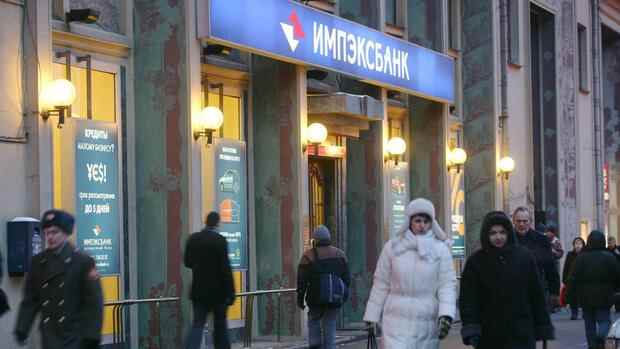The institute’s involvement in Russia totals 22.85 billion euros. The credit volume amounts to more than eleven billion euros.
(Photo: BLOOMBERG NEWS)
Frankfurt Investors fear a Russian invasion of Ukraine and are fleeing the European stock markets. Many financial stocks were among the big losers on Monday – shares in financial institutions heavily involved in Russia fell particularly sharply.
The titles of the Austrian Raiffeisen Bank lost more than ten percent at times. The last time there was a comparable high loss was a year and a half ago. Shares were still down 6.8 percent in the afternoon. The stocks of the Italian bank Unicredit also lost almost five percent, shares of the French bank Société Générale even lost more than six percent.
According to analysts at DZ Bank, the consequences of an escalation of the Ukraine crisis can only be estimated with great difficulty. In addition to the direct consequences of restricting banking activities in Russia, an economic crisis could also affect western banks if it caused credit quality to deteriorate.
According to an analysis by DZ Bank, the French and Italian banks each have the largest commitment in Russia, at around 25 billion euros. Austria follows in third place with 17.5 billion euros. German banks come in at less than half this figure and rank sixth behind the USA and Japan.
Top jobs of the day
Find the best jobs now and
be notified by email.
>> Read here: Dax calms down after a 580-point slide – Ukraine crisis lets investors buy gold and government bonds
Among individual institutions, Société Générale is the largest European bank in Russia and ranks ninth in terms of total assets on the list of the country’s most important credit institutions. The Austrian Raiffeisenbank International (RIB) follows in tenth place and the Italian Unicredit in eleventh place.
German banks under pressure too
For the Austrian Raiffeisen Bank, Russia is by far the most important individual market, which recently delivered a net profit of 474 million euros. This corresponds to around 30 percent of the group’s unconsolidated net profit. Because of this dependency on the Russian market, RIB is the international bank with the greatest Russian risk for the DZ analysts.
The stocks of German banks also came under pressure on Monday. Deutsche Bank shares temporarily lost 4.8 percent at midday, Commerzbank 5.2 percent – before both share prices rose again in the afternoon. However, the Commerzbank stocks were also weighed down by statements made by Federal Finance Minister Christian Lindner. In an interview with the Handelsblatt, he made it clear that the state stake in Commerzbank will not last.
Banks are currently not planning to evacuate employees
134 employees currently work for Commerzbank in Moscow. The institute is only represented by one employee in the Ukraine. A Commerzbank spokeswoman said there are currently no plans to close the locations or evacuate the employees. “We are monitoring the development of the situation very closely and continue to hope for a diplomatic solution to the conflict.”
Commerzbank’s involvement in Ukraine is negligible, “and that’s not so big in Russia that it would give us sleepless nights,” said the spokeswoman. “It is well below exposure to other markets in Eastern Europe.” In the event of an armed conflict, the turmoil in the global economy and capital markets would weigh more heavily on Commerzbank.
Deutsche Bank is active in Moscow with two different units: Around 200 employees offer corporate banking products such as trade financing, cash management and currency products, primarily for large international corporations. Around 1,500 IT employees also work in the DB Tech Center. In Ukraine, around 35 Deutsche Bank employees primarily deal with trade finance for German and international companies.
There are currently no plans for an evacuation, said a spokesman for the bank. The employees on site are mostly local workers. The institute is monitoring the situation closely. Deutsche Bank does not publish exact figures on the extent of its involvement in Russia and Ukraine. However, the commitment in the two countries is “very manageable and not large,” said the spokesman.
More: Rising interest rates are dividing the stock exchanges – things are now getting critical for these stocks
With agency material.
